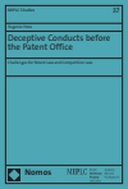Explore

Deceptive Conducts Before the Patent Office
Eugenio Hoss
2019
0 Ungluers have
Faved this Work
Login to Fave
In an increasingly harmonized global patent landscape, few issues still distinguish the US patent system as much as its strict–and often criticized–duty of candor and its inequitable conduct doctrine. The EPO and most other countries around the world impose less burdensome disclosure duties upon patent applicants. What is there to learn from the experience in the US? Have these tools resulted in any benefit worth considering? Yet regardless of the disclosure duties imposed upon patent applicants, a deceptive conduct before the Patent Office could lead to unwarranted exclusive rights and have a negative impact on competition. Should antitrust law intervene? Is it a case of sham litigation? This work attempts to answer those questions through a comparative analysis, examining the law and case law in the US and in the EU from both a patent and a competition law perspective and seeking a workable theory of harm.
This book is included in DOAB.
Why read this book? Have your say.
You must be logged in to comment.
Rights Information
Are you the author or publisher of this work? If so, you can claim it as yours by registering as an Unglue.it rights holder.Downloads
This work has been downloaded 98 times via unglue.it ebook links.
- 98 - pdf (CC BY-NC-ND) at Unglue.it.
Keywords
- Apotex
- AstraZeneca
- Competition Law
- duty of candor
- Fraud before the Patent Office
- high court
- inequitable conduct
- irreführendes Verhalten
- kristalline Form
- Law
- LJ Jacob
- patent law
- Patent Office
- Patentamt
- Patentanmeldung
- Patentrecht
- Perindopril
- pharmazeutischer Patient
- Scheincharakter
- Servier
- Supreme Court
- tert-Butylaminsalz
- Walker Process
- Wettbewerbsrecht
Links
DOI: 10.5771/9783748902577Editions

